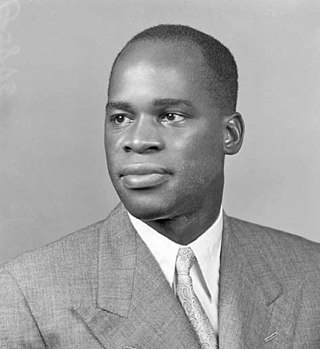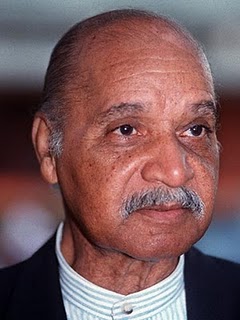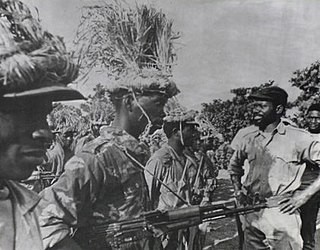1920s
In 1920 or 1923, a government sponsored organisation, the Liga Africana was established in Lisbon for assimilados , members of the tiny minority of Africans in the colonies who had been given citizenship status. [1] Gibson states that "although it gathered together only some twenty African and mulatto intellectuals, [it] had significant repercussions in the colonies." [2] Later, in Mozambique, the Associação Africana was established for assimilated mulattoes; and the Associação dos Naturais de Moçambique for Whites born in Mozambique. (In the 1950s the latter organisation opened its doors to non-Whites and fought for a non-racial society.) According to Chilcote, "Africans manifested demands through these organisations by urging moderate reforms in the 1930s and focusing discussion on direct participation for the urban masses in the 1940s. The government reacted by replacing elected leaders with administrative appointees and by dominating and interfering with the activities of these organisations." [3] When the Associação Africana came partially under government control, the more determined of the nationalists in it formed the Instituto Negrófilo. This was later forced by the government to change its name to Centro Associativo dos Negros de Moçambique; and was banned in 1965 for alleged subversion and terrorism. [4] The government also intervened in the Associação dos Naturais de Moçambique, replacing its leadership, and, according to Chilcote, ending its effectiveness. [5]
Besides these groups a newspaper, O Brado Africano was established in the early 1920s. One of the first African weeklies on the continent, it provided an outlet for native dissent. Chilcote, in 1967, wrote that "Although controlled by the Salazar government, it remains African-oriented." [5]
The Casa dos Estudantes do Império was a semi-official centre for African students in Lisbon. It was pronounced subversive and closed by the government in 1965.
1950s
By the mid 1950s clandestine political movements had formed. Above ground intellectual nationalism continued: African intellectuals studying at Portuguese universities established the Movimento Anti-Colonista (MAC) as an outgrowth of the Casa dos Estudantes do Império. A few of the African students in Portugal, including the Angolan Mário Pinto de Andrade and the Mozambican Marcelino dos Santos, left Portugal and settled in Paris, where, Chilcote says, they "associated with French African advocates of négritude and others who sought an African culture, traditional in tone but modern and sophisticated in content." [6] In South Africa, Mozambican secondary-school students who had been sent there to study formed an offshoot of the Centro Associativo dos Negros de Moçambique called the Núcleo dos Estudantes Africanos Secundários de Moçambique (NESAM). Its tiny membership included several who would go on to become leaders in the liberation movement, including future FRELIMO president, Eduardo Mondlane.
At the second All-African Peoples' Conference, in Tunis, 1960, the MAC was superseded by the Frente Revolucionária Africana para a Indêpencia das Colônais Portuguesas (FRAIN).
In the 1950s and 1960s, government suppression of radicalism in Mozambique was severe enough that the important national liberation groups all had to carry on their existences outside the country. The first organisation with full intentions toward national liberation was founded by Mozambican exiles in Rhodesia (now Zimbabwe) and Nyasaland (now Malawi), on October 2, 1960, and called the União Democrática Nacional de Moçambique (UDENAMO). Its founding leader was Adelino Gwambe. Tanganyikan (now Tanzanian) president Julius Nyerere was sympathetic to the nationalists, and in April 1961 UDENAMO moved its headquarters to Tanganyika's capital, Dar es Salaam. Its members at various times included:
1960s
In February 1961 a second nationalist organisation, the Moçambique National African Union (MANU) was formed out of several small groups including the Mocambique Maconde Union of Northern Moçambique and Tanganyika. Its members had been inspired, and were supported by, the Kenya African National Union (KANU) and the Tanganyika African National Union (TANU). Matthew Mmole was founding president, and M. M. Mallianga Secretary-General. After Tanganyika's independence in December 1961, MANU moved to Dar es Salaam.
A third organisation, the União Africana de Moçambique Independente (UNAMI) was formed by exiles from the Tete district. It too moved to Dar es Salaam in 1961.
In April 1961 Adelino Gwambe travelled to Rabat to represent all three parties, UDENAMO, MANU and UNAMI, at the conference where FRAIN was disbanded and replaced by the Confederação das Organizações Nacionalistas das Colónias Portuguesas (CONCP).
In June 1962, with encouragement from both the CONCP and Nyerere, UDENAMO, MANU, and UNAMI merged to form the Frente de Libertação de Moçambique (FRELIMO). At the first FRELIMO congress, at Dar es Salaam in late September 1962, Eduardo Mondlane was elected its President. After many years of FRELIMO's struggle, Mozambique become independent in 1975.

Samora Moisés Machel was a Mozambican military commander and political leader. A socialist in the tradition of Marxism–Leninism, he served as the first President of Mozambique from the country's independence in 1975.
Pascoal Manuel Mocumbi was a Mozambican politician who served as Prime Minister from 1994 until 2004. His traditional name was Mahykete.

FRELIMO is a democratic socialist political party in Mozambique. It is the dominant party in Mozambique and has won a majority of the seats in the Assembly of the Republic in every election since the country's first multi-party election in 1994.

Eduardo Chivambo Mondlane was the President of the Mozambican Liberation Front (FRELIMO) from 1962, the year that FRELIMO was founded in Tanzania, until his assassination in 1969. Born in Mozambique, he was an anthropologist by profession, and worked as a history and sociology professor at Syracuse University before returning to Mozambique in 1963.

José Craveirinha was a Mozambican journalist, story writer and poet, who is today considered the greatest poet of Mozambique. His poems, written in Portuguese, address such issues as racism and the Portuguese colonial domination of Mozambique. A supporter of the anti-Portuguese group FRELIMO during the colonial wars, he was imprisoned in the 1960s. He was one of the African pioneers of the Négritude movement, and published six books of poetry between 1964 and 1997. Craveirinha also wrote under the pseudonyms Mário Vieira, José Cravo, Jesuíno Cravo, J. Cravo, J.C., Abílio Cossa, and José G. Vetrinha.
The Eduardo Mondlane University is the oldest and largest university in Mozambique. The UEM is located in Maputo and has about 40,000 students enrolled.

The National Democratic Union of Mozambique was a nationalist organization founded in Salisbury, Southern Rhodesia in 1960. It was led by Adelino Gwambe and consisted mostly of migrant workers and disgruntled students who had fled central and southern regions of Mozambique. It was formed to oppose Portuguese colonial rule in Mozambique. In June 1962, UDENAMO merged with two other nationalist organizations, the National African Union of Independent Mozambique (UNAMI) and Mozambican African National Union (MANU) to form the Mozambique Liberation Front (FRELIMO).
Luís Bernardo Honwana is a Mozambican author and statesman.

The Mozambican War of Independence was an armed conflict between the guerrilla forces of the Mozambique Liberation Front or FRELIMO and Portugal. The war officially started on September 25, 1964, and ended with a ceasefire on September 8, 1974, resulting in a negotiated independence in 1975.

Marcelino dos Santos was a Mozambican poet, revolutionary, and politician. As a young man he travelled to Portugal, and France for an education. He was a founding member of the Frente de Libertação de Moçambique, in 1962, and served as the party's deputy president from 1969 to 1977. He was Minister of Economic Development in the late 1970s, Frelimo Political Bureau member in charge of the economy in the early 1980s, Chairman of the country's parliament, the Assembly of the Republic, from 1987 to 1994, and, as of 1999, remained a member of the Frelimo Central Committee. He represented the left wing of the party, remaining an avowed Marxist-Leninist, despite the party's embrace of capitalism in recent decades, an embrace which dos Santos declared was temporary.

Christianity is the largest religion in Mozambique, with substantial minorities of the adherents of traditional faiths and Islam.

Josina Abiathar Muthemba Machel was a leader of FRELIMO and a significant figure in the struggle for independence in Mozambique.
Uria Timoteo Simango was a Mozambican Presbyterian minister and prominent leader of the Mozambique Liberation Front (FRELIMO) during the liberation struggle against Portuguese colonial rule. His precise date of death is unknown as he was extrajudicially executed by the post-independence government of Samora Machel.
The Conference of Nationalist Organizations of the Portuguese Colonies was an organization for coordination and cooperation between the national liberation movements of the Portuguese colonies in Africa during the Portuguese Colonial War.
Janet Rae Johnson Mondlane is an American-born Mozambican activist. Together with her husband, Eduardo Chivambo Mondlane, she founded Frelimo and helped organize the liberation of Mozambique from the Portuguese colonialists.
The present honours and decorations were passed by the Mozambican Assembly of the Republic in March 2011. It consists of two honorary titles, five Orders and some medals. The awards are managed by the National Commission on Honours and Decorations. The President of Mozambique will present the awards after recommendation by the Assembly, the provincial and central governments, the armed forces and the educational establishment.
The Wiriyamu Massacre or Operation Marosca was a massacre of the civilian population of the village of Wiriyamu in Mozambique by Portuguese soldiers in December 1972.
Paulo José Gumane was a Mozambican union activist, politician and guerrilla leader active during the Mozambican War of Independence. A founder member of the independence movement FRELIMO, he later broke with it and was involved with a number of opposition organisations, notably the Zambia-based COREMO.
Sérgio Vieira was a Mozambican politician and poet. He was Director of the Department of Education and Culture at Frelimo, Governor of the Banco de Moçambique and Minister of Security and of Agriculture.
Raúl Alves Calane da Silva was a Mozambican writer, journalist, and poet.









